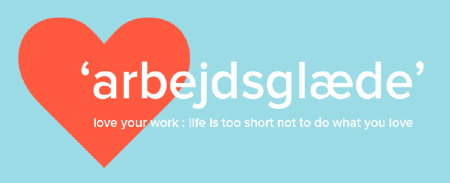The general attitude you encounter in most U.S. workplaces is that people dislike their job, aren’t that engaged, don’t love their managers, don’t feel respected, think their manager doesn’t understand motivation — and yet are always busy and don’t have time for vacation. In short, a lot of U.S. people tend to dislike their jobs but tolerate them. (This isn’t all people. Some people love their jobs, some people don’t even work, and some people hate their jobs and leave them.)
It doesn’t have to be this way, though. In other countries/regions of the world, people enjoy work much more — or at least slightly more — and there’s even a word that puts a lot of this into context: Arbejdsglæde.
Arbejdsglæde is a Danish word. It combines “Arbejde,” meaning work, and “glæde,” meaning happiness. It literally means “happiness at work.” Danish thus has a word for that. English does not.
I’m personally a huge fan of Scandinavia, but I also understand it’s a much different place than the U.S. For example, the populations there tend to be very homogenous; the U.S. is very different than that. So directly comparing them is a fool’s errand. But still, the Danish — and other Scandinavian cultures — do a lot of positive things around work, detailed here. Among the notable aspects:
- Flexible work days (I’ve written this about too). The standard U.S. work schedule makes no sense to me. It’s been 9 to 5 for a generation or two now, right? It’s actually probably getting more rather than less at this point, i.e. 8 to 7 might be a standard for some. But the thing is, we have more technology. I realize that means more people to contact at more hours, but it also means more effective ways to get work done. Why are we still working the same basic schedule with the advent of all this technology? Makes little sense. Simply because of Microsoft Office and Google being invented, most things at work should be taking you less time.
- Unemployment insurance: In Denmark, it’s 90 percent of your original salary for two years. Damn.
- Low Power Distance: This will never change in the U.S., but what the concept basically means is this — in the United States, if your boss tells you to do something, you basically do it. In Denmark, you can view it as a suggestion. I’m torn on this. I think hierarchy is a good thing for organizing teams with people of differing intellects — i.e. I don’t think most human brains will know what work to do and how to prioritize it without someone explicitly telling them — but I also think totally eliminating hierarchy would be amazing in some ways.
- Constant Training: We already know training differentiates “good companies” from “great companies,” but we also know a lot of companies don’t invest in it because it seems like a soft skill and, frankly, what if people leave your company? Isn’t that training then just paying bills for a competitor? Denmark and other Scandinavian countries focus on life-long development, which is something more companies here need to consider.
- Focus on Happiness: They have a fucking word for “happiness at work.” We don’t.
Look, I understand many Americans who might stumble across this and read it will just think, “Oh, that’s a socialist country in another part of the world…” and ignore this. That’s a natural reaction. Can they be directly compared? No. But could the U.S. start thinking about work a little differently and helping people be happier there? Absolutely.
